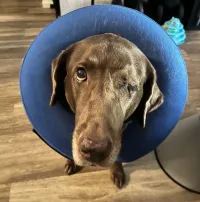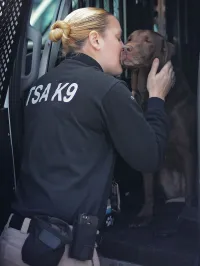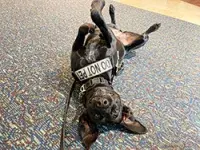
Most pet owners have a strong affection for their furry family members, but there’s an especially close bond between a working dog and its handler.
Andrew Hotinger, TSA headquarters canine coordinator, said it’s the result of intensive training and a handler’s deep understanding of what makes their dog tick.
It’s this special service to our country that inspires the head of a northern Virginia nonprofit organization to help many of our nation’s retired military and law enforcement canines, including retired TSA canines, in need of special health care in their later years.
Bob Youngblood created Paws of Honor in 2015 to provide veterinary care and products to retired canines across America.
“Best case scenario is the handler would adopt their canine after the canine’s retirement from service and take on the financial burden of all veterinary care. Worst case – the handler has to choose life or death,” said Youngblood. “Paws of Honor members have all of their canines’ vet care, medications, preventative care and food 100% paid for by Paws of Honor with the goal to relieve all financial burdens.”
After 9/11, Youngblood, then director of Old Dominion Animal Health Center in McLean, Virginia, knew he wanted to help working dogs who needed health care. “These dogs are often the first and last line of defense in the war on terrorism – everything from securing our airports to detecting improvised explosive devices to conducting missions that make the entire world safer,” he said.
Youngblood said 20 retired TSA canines are enrolled in the program and so far have received $61,000 in financial support from Paws of Honor.
When Hotinger’s retired canine partner Cheddar, a yellow Labrador retriever, blew out a knee ligament, Hotinger wasn’t about to let his companion and former coworker live out his senior years in pain. Cheddar served his country and helped Hotinger’s career move to aviation security.
Paws of Honor helped pay for a brace to support Cheddar’s leg.
“Working dogs are athletes and generally suffer the same type of injuries professional athletes incur – soft tissue, back injuries, ruptured ACLs, etc.,” Hotinger noted. “Training and utilization are sometimes repetitive and drive repetitive exercise injuries. Our dogs work on concrete floors as well as irregular terrain and are expected to traverse these areas seamlessly to detect explosives odor at its strongest point of concentration.”
TSA canine cancer victim gets help
Paws of Honor came to the rescue of a retired TSA canine with cancer.
Former Canine Handler Lorene Smith is now a program analyst for TSA’s canine program. Smith and her furry partner Maggie graduated from canine training school in 2012 and were named top dog in their class. They served at San Diego International and Washington Dulles International Airports before Maggie’s retirement in 2017. Earlier this year, Smith noticed a spot in Maggie’s left eye, which turned out to be cancer.
“It was devastating news to say the least,” said Smith. “So much uncertainty on how we would handle this and how she may or may not get through it.”
Paws of Honor was there, putting their credit card on file to pay for Maggie’s vet bills.
A doctor had to remove Maggie’s left eye but contained the cancer.
“Since Paws of Honor was there for us, the cost was never part of our worry,” Smith emphasized. “They recognize and respect the bond a handler has with their canine and understand it’s not just a pet. We have endured a career together, and our success depended on each other.”
Youngblood said once a TSA canine retires, the handler can go onto the Paws of Honor website and submit an enrollment eligibility application. His group often provides monthly medications, including flea and tick prevention, biannual wellness exams and more advanced care.
Commitment to TSA’s retired canines
Similar to TSA’s Strategy to “Commit to Our People,” Hotinger said the National Explosives Detection Canine program is committed to the agency’s retired dogs. The program ensures that adoptive families, within TSA or external, understand the canine’s history and potential for medical needs.
“Anyone adopting a TSA canine must complete and sign a document that ensures they understand what is expected for the care of the canine through retirement,” said Hotinger. “Individually, we have personal friendships with the canine teams we know and have worked with, and we frequently check on them in retirement.”
He said the bond between a handler and their canine partner is unique and unlike the bond you will likely ever develop with a pet.
“You can’t fully understand this until you have experienced it,” Hotinger said. “I was only on leash with Cheddar a short time, but the bond began immediately during training at the TSA Canine Training Center and only got stronger over time. In comparison, I can only imagine how much stronger this bond is for those in the military and those on leash longer than I was. Paws of Honor is there for all of us.”
Editor’s Note: Paws of Honor, Inc. is a 501(c)(3) nonprofit organization which relies on charitable contributions. If you would like to make a tax-deductible donation, please visit Paws of Honor (givesmart.com) or text PAWSDONATE to 41444.
By Don Wagner, TSA Strategic Communications & Public Affairs



